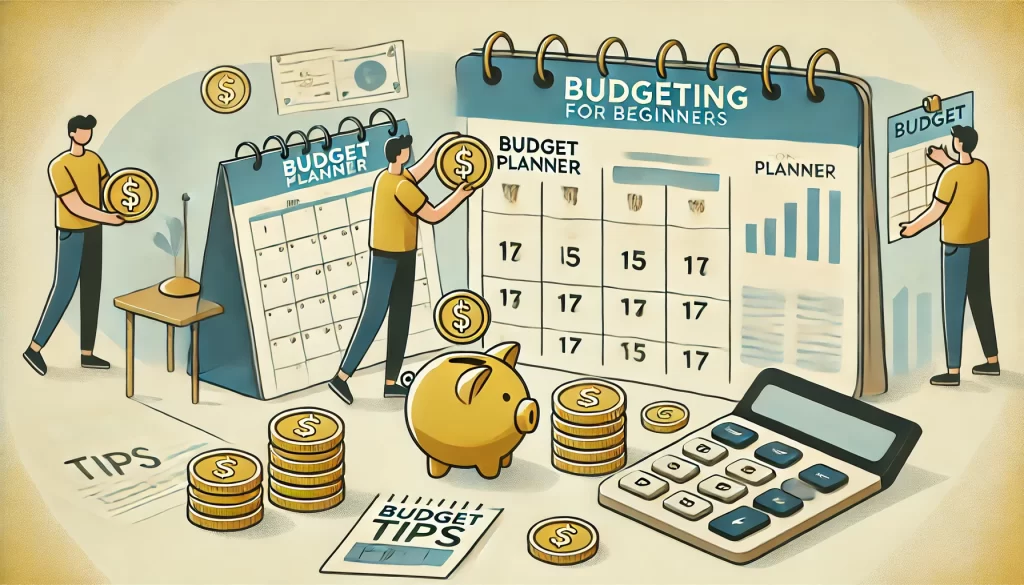I once looked at my bank account and felt scared. I wondered where my money went. If you feel the same, don’t worry. I have simple tips to help you manage your money.
Budgeting isn’t about saying no to things. It’s about freedom. It’s about knowing where your money goes and making it work for you. With basic money skills, you can start saving and reaching your goals fast.
Money talk can be scary. But it doesn’t have to be. I’ll share easy money-saving tips for beginners. These tips will help you build a strong financial future.
Are you ready to start? Great! Let’s look at some budgeting basics for success. Remember, every expert was once a beginner. The most important step is to start.
Key Takeaways
- Budgeting is about freedom, not restriction
- Start with your net income, not gross salary
- Track your spending to understand your habits
- Set realistic financial goals
- Choose a budgeting system that works for you
- Regularly review and adjust your budget
- Differentiate between needs and wants
Understanding the Basics of Budgeting
Learning to budget is a big step towards financial success. It’s not as hard as it looks. Let’s look at the basics of budgeting and clear up some myths.
What is a budget?
A budget is your own money plan. It tracks how much money you make and spend. It helps you make smart money choices.
Why is budgeting important?
Budgeting is key for understanding money. It shows you where your money goes and helps you spend less. It also helps you make better choices.
Many students use apps to track their spending. By planning your money, you can reduce stress and reach your goals.
Common budgeting misconceptions
Some think budgeting means you can’t have fun or that it’s only for those in trouble. But that’s not right! Budgeting is about making smart choices, not cutting back too much.
For example, many students set aside money for fun. This shows budgets can include enjoying life too!
- Myth: Budgeting is too time-consuming
- Reality: Modern apps make it quick and easy
- Myth: You need a large income to budget
- Reality: Budgeting helps at any income level
- Myth: Budgets are rigid and unchanging
- Reality: They’re flexible and adapt to your needs
Remember, budgeting gets better with practice. Start simple, stay consistent, and you’ll get the hang of it!
Simple Budgeting Tips for Beginners
Starting a budget can feel overwhelming. But it’s a crucial step towards financial stability. Let’s explore some easy budgeting strategies for starters. These tips will help you develop smart money habits.
Calculate your net income
The first step is to know how much money you have. I start by calculating my net income. This means adding back any automatic deductions to my take-home pay. It’s important to have a clear picture of your total earnings before diving into expense tracking techniques.
Track your spending
Understanding where your money goes is key. I use my credit card and bank statements to categorize expenses. This helps me identify areas where I can cut back and save more effectively.
Set realistic financial goals
Financial goal setting is crucial for staying motivated. I set both short-term and long-term goals. For example, I aim to save 3 to 6 months of expenses for an emergency fund. Remember, SMART goals are specific, measurable, attainable, relevant, and timely.
Choose a budgeting system that works for you
There are various budgeting strategies for starters. I personally find the 50/20/30 rule helpful. It allocates 50% of income to essentials, 20% to savings or debt, and 30% to non-essentials. Experiment with different systems to find what suits your lifestyle best.
| Budgeting System | Description | Best For |
|---|---|---|
| 50/20/30 Rule | 50% essentials, 20% savings, 30% wants | Balanced lifestyle |
| Zero-Based Budget | Every dollar has a purpose | Detailed planners |
| Envelope System | Cash-only for specific categories | Overspenders |
Remember, budgeting takes time to master. Be patient with yourself as you develop these smart money habits. With consistent practice, you’ll soon find yourself on the path to financial success.
Creating Your First Budget
I’m excited to share some budgeting made easy tips to help you start your money management journey. Creating your first budget might seem daunting. But it’s a crucial step in taking control of your finances.
Let’s break down the process into simple steps. First, list all your income sources. For example, if your total monthly income is $6,500, that’s your starting point. Next, categorize your expenses. Here’s a quick breakdown:
- Food: Groceries – $700
- Utilities: Electricity – $130, Water – $60, Natural Gas – $40
- Housing: Mortgage – $1,450, HOA Fees – $50
- Transportation: Gasoline – $180
Now, apply the 50/30/20 rule: 50% for needs, 30% for wants, and 20% for savings and debt reduction methods. This beginners’ guide to budgeting helps you prioritize your spending and saving goals.
Remember, budgeting is a skill that improves with practice. Don’t be discouraged if you need to make adjustments. In fact, 73% of people who budget regularly make changes due to shifting financial situations. Embrace frugal living hacks to stretch your dollars further and stay on track with your financial goals.
By following these money management 101 principles, you’re setting yourself up for financial success. Start small, be consistent, and watch your financial health improve over time.
Essential Categories to Include in Your Budget
When I make a spending plan, I start with the basics. I use budget tracking tools to organize these categories. Here are the key areas I include in my budget.
Housing and utilities
Housing is my biggest expense. I try to keep it at 25-35% of my income. In California, that’s $891 to $1,247 a month. This includes rent or mortgage and utilities like electricity and water.
Food and groceries
I spend 10-15% of my income on food. That’s $356 to $535 a month. It covers groceries and sometimes eating out. Planning meals and using coupons helps me save.
Transportation
Transportation costs 10-15% of my budget. That’s $356 to $535 a month. I include car payments, gas, and public transit. I also budget for maintenance and parking fees.
Debt repayment and savings
I save 10-20% of my income for savings and debt. That’s $356 to $713 a month. I focus on building an emergency fund and saving for retirement. I aim to save 15% for retirement.
Personal and discretionary spending
Finally, I save 5-10% for personal and fun expenses. That’s $178 to $356 a month. It covers subscriptions, hobbies, and nights out. This balance helps me stay on track with my financial goals.
In conclusion
Starting a budget may seem intimidating, but with a few simple tips, it can become a manageable and empowering tool for financial success. By tracking expenses, setting realistic goals, and using budgeting methods that work for your lifestyle, you’ll gain control over your finances and set yourself up for long-term savings. The key is consistency and starting small.






